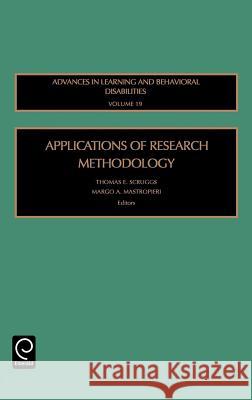Applications of Research Methodology » książka
Applications of Research Methodology
ISBN-13: 9780762312955 / Angielski / Twarda / 2006 / 348 str.
Research in learning and behavioral disabilities, employing a variety of methods and techniques, has provided a wealth of information relevant to practitioners. In order to be of value, however, this research must employ appropriate and rigorous methodology. Recent years have witnessed a variety of new techniques for research synthesis, research design, and data analysis, many of which have been applied to the study of learning and behavioral disabilities. In this volume, a variety of methodological approaches to research is described, applied, and evaluated. Chapters in this volume provide discussions of applications of qualitative research methodology, and techniques for statistical analysis for single subject data. In addition, techniques for structural equation modeling and item response theory are described with specific reference to the study of learning and behavioral disorders, as are techniques for handling missing data. Also discussed are procedures for dealing with specific research problems in areas such as behavioral disorders, school-wide intervention systems, and early reading as well as more general literacy interventions. Finally, methodology for integrative research reviews are described, as well as applications of research synthesis to quantitative research on cognitive processes in mathematics, and to qualitative research in co-teaching. This volume contains chapters authored by internationally recognized experts in the field of learning and behavioral disabilities. This book is intended for interested professionals and practitioners; researchers in learning and behavioral disabilities; and graduate students in psychology, education, and special education, particularly those interested in applications of research methodology in the study of learning and behavioral disabilities. It discusses, applies and evaluates different methodological approaches to learning and behavioral disorder research; has internationally recognized contributors; and serves as a practical reference to educators, researchers, psychologists, professionals and practitioners.











